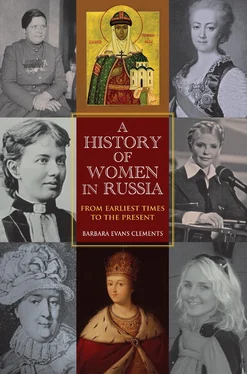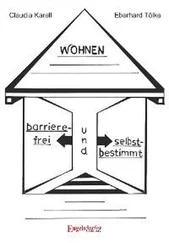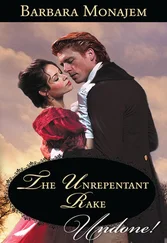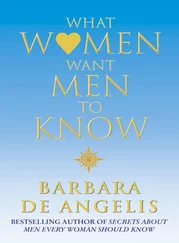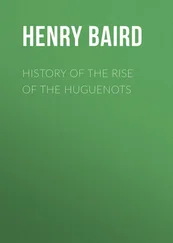Kessler-Harris, Alice. Out to Work: A History of Wage-Earning Women in the United States . Oxford: Oxford University Press, 1982.
Kivelson, Valerie A. “Coerced Confessions, or if Tituba Had Been Enslaved in Muscovy.” In The New Muscovite Cultural History: A Collection in Honor of Daniel B. Rowland, edited by Valerie A. Kivelson, Karen Petrone, Nancy Shields Kollmann, and Michael S. Flier. Bloomington, Ind.: Slavica, 2009.
——. “The Effects of Partible Inheritance: Gentry Families and the State in Muscovy.” The Russian Review 53, no. 2 (April 1994): 197–212.
——. “Male Witches and Gendered Categories in Seventeenth-Century Russia.” Comparative Studies in Society and History 45, no. 3 (2003): 606–31.
——. “Patrolling the Boundaries: Witchcraft Accusations and Household Strife in Seventeenth-Century Muscovy.” Harvard Ukrainian Studies 19, edited by Nancy Shields Kollmann, Donald Ostrowski, Andrei Pliguzov, and Daniel Rowland, 302–23. Cambridge, Mass.: Harvard University Press, 1995.
——. “Political Sorcery in Sixteenth-Century Muscovy.” In Culture and Identity in Muscovy, 1359-1584, edited by A. M. Kleimola and G. D. Lenhoff. Moscow: ITZ-Garant, 1997.
——. “Sexuality and Gender in Early Modern Russian Orthodoxy: Sin and Virtue in Cultural Context.” In Letters from Heaven: Popular Religion in Russia and Ukraine, edited by John-Paul Himka and Andriy Zayarnyuk. Toronto, Ont.: University of Toronto Press, 2006.
——. “Through the Prism of Witchcraft: Gender and Social Change in Seventeenth-Century Muscovy.” In Russia’s Women: Accommodation, Resistance, Transformation, edited by Barbara Evans Clements, Barbara Alpern Engel, and Christine D. Worobec. Berkeley: University of California Press, 1991.
Kleimola, Ann M. “‘In Accordance with the Canons of the Holy Apostles’: Muscovite Dowries and Women’s Property Rights.” The Russian Review 51, no. 2 (April 1992): 204–29.
Koblitz, Ann Hibner. A Convergence of Lives: Sofia Kovalevskaia, Scientist, Writer, Revolutionary . Boston: Birkhäuser, 1983.
Koenker, Diane P. “Urbanization and Deurbanization in the Russian Revolution and the Civil War.” In Party, State, and Society in the Russian Civil War, edited by Diane P. Koenker, William G. Rosenberg, and Ronald Grigor Suny. Bloomington: Indiana University Press, 1989.
Kollmann, Nancy Shields. Kinship and Politics: The Making of the Muscovite Political System, 1345–1547 . Stanford, Calif.: Stanford University Press, 1987.
——. “The Seclusion of Elite Muscovite Women.” Russian History 10, part 2 (1983): 170–87.
——. “Self, Society, and Gender in Early Modern Russia and Eastern Europe.” In A Companion to Gender History, edited by Teresa A. Meade and Merry E. Wiesner-Hanks. Malden, Mass.: Blackwell, 2004.
——. “‘What’s Love Got to Do with It?’ Changing Models of Masculinity in Muscovite and Petrine Russia.” In Russian Masculinities in History and Culture, edited by Barbara Evans Clements, Rebecca Friedman, and Dan Healey. Houndmills, UK: Palgrave, 2002.
Kononenko, Natalie. “Folk Orthodoxy: Popular Religion in Contemporary Ukraine.” In Letters from Heaven: Popular Religion in Russia and Ukraine, edited by John-Paul Himka and Andriy Zayarnyuk. Toronto, Ont.: University of Toronto Press, 2006.
Krylova, Anna. Soviet Women in Combat: A History of Violence on the Eastern Front . Cambridge: Cambridge University Press, 2010.
Kuehnast, Kathleen, and Carol Nechemias. “Introduction: Women Navigating Change in Post-Soviet Currents.” In Post-Soviet Women Encountering Transition: Nation Building, Economic Survival, and Civic Activism, edited by Kathleen Kuehnast and Carol Nechemias. Washington, D.C.: Woodrow Wilson Center Press, 2004.
Kuxhausen, Anna. “Ideal Citizens/Ideal Mothers: Discourse and Experience at Smolnyi Institute, 1764–1783.” Paper presented at the Midwest Russian History Colloquium, DeKalb, Ill., October 2001.
Langer, Lawrence N. “The Black Death in Russia: Its Effects upon Urban Labor.” Russian History 2, nos. 1–2 (1975): 53–67.
Lenhoff, Gail, and Janet Martin. “Marfa Boretskaia, Posadnitsa of Novgorod: A Reconsideration of Her Legend and Her Life.” Slavic Review 59, no. 2 (Summer 2000): 343–68.
Levin, Eve. “The Christian Sources of the Cult of St. Paraskeva.” In Letters from Heaven: Popular Religion in Russia and Ukraine, edited by John-Paul Himka and Andriy Zayarnyuk. Toronto, Ont.: University of Toronto Press, 2006.
——. “The Role and Status of Women in Medieval Novgorod.” Ph.D. dissertation. Indiana University, 1983.
——. Sex and Society in the World of the Orthodox Slavs . Ithaca, N.Y.: Cornell University Press, 1989.
Lincoln, W. Bruce. Nicholas I, Emperor and Autocrat of All the Russias. Bloomington: Indiana University Press, 1978.
Lindenmeyr, Adele. “The Elusive Life of Countess Sofia V. Panina, 1871–1956.” Paper presented at the annual meeting of the American Association for the Advancement of Slavic Studies, December 2004.
——. Poverty Is Not a Vice: Charity, Society, and the State in Imperial Russia. Princeton: Princeton University Press, 1996.
Livezeanu, Irina, June Pachuta Farris, Mary Zirin, and Christine Worobec, editors. Women and Gender in Central and Eastern Europe, Russia, and Eurasia. 2 vols. Armonk, N.Y.: Sharpe, 2007.
Lyon, Tania Rands. “Housewife Fantasies, Family Realities in the New Russia.” In Living Gender after Communism, edited by Janet Elise Johnson and Jean C. Robinson. Bloomington: Indiana University Press, 2007.
MacKenzie, David and Michael W. Curran. A History of Russia, the Soviet Union, and Beyond. Fourth edition. Belmont, Calif.: Wadsworth, 1993.
Madariaga, Isabel de. Russia in the Age of Catherine the Great. New Haven: Yale University Press, 1981.
Malysheva, Marina, Marina Pisklakova, Natalia Rimashevskaya, and Dana Vannoy. Marriages in Russia: Couples during the Economic Transition. New York: Praeger, 1999.
Manning, Roberta. “Women in the Soviet Countryside on the Eve of World War II, 1935–1940.” In Russian Peasant Women, edited by Beatrice Farnsworth and Lynne Viola. New York: Oxford University Press, 1992.
Marody, Mira, and Anna Giza-Poleszczuk. “Changing Images of Identity in Poland: From the Self-Sacrificing to the Self-Investing Woman?” In Reproducing Gender: Politics, Publics, and Everyday Life after Socialism, edited by Susan Gal and Gail Kligman. Princeton: Princeton University Press, 2000.
Marrese, Michelle Lamarche. “From Maintenance to Entitlement: Defining the Dowry in 18th-Century Russia.” In Women and Gender in 18th-Century Russia, edited by Wendy Rosslyn. Aldershot, UK: Ashgate, 2003.
——. A Woman’s Kingdom: Noblewomen and the Control of Property in Russia, 1700–1861. Ithaca, N.Y.: Cornell University Press, 2002.
“Marry Indian, Save Russia.” RIA Novosti, September 12, 2007, as published in Hindustan Times. http://www.hindustantimes.com. Accessed October 16, 2007.
Martin, Janet. Medieval Russia, 980–1584. Cambridge: Cambridge University Press, 1995.
Mason, Emma. “Women in the Gulag in the 1930s.” In Women in the Stalin Era, edited by Melanie Ilic. Houndmills, UK: Palgrave, 2001.
McDermid, Jane, and Anna Hillyar. Women and Work in Russia, 1880–1930: A Study in Continuity through Change . London: Longman, 1998.
McNeal, Robert H. “Women in the Russian Radical Movement.” Journal of Social History 2, no. 5 (Winter 1971–72): 143–63.
Читать дальше
